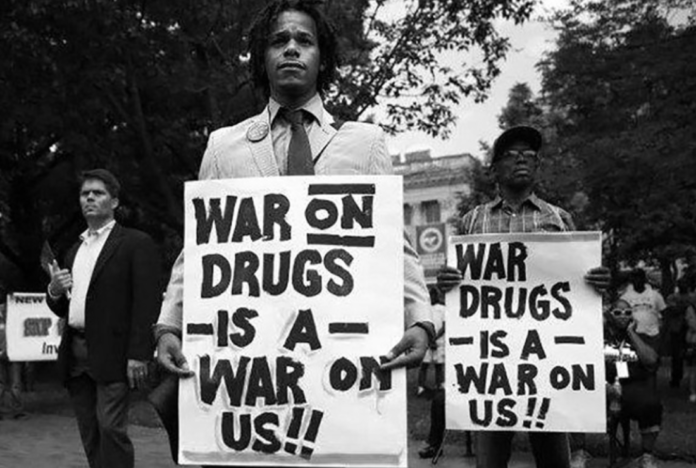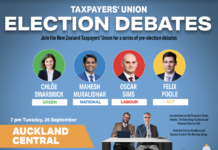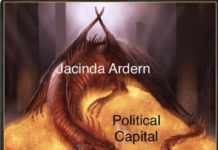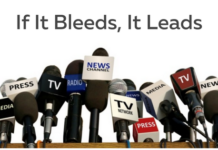Last week I read Antony Loewenstein’s 2019 book “Pills, Powder and Smoke – inside the bloody war on drugs”. Antony is a renowned Australian journalist who toured New Zealand in July promoting his latest best-selling book “The Palestine Laboratory”.
His book on drugs involved widespread research, interviews and investigation over many years in places of drug production, transit and consumption such as Honduras, Guinea-Bissau, the Philippines, US, UK and Australia. His book is a powerful indictment on the “prohibition” approach to drugs and an appeal for a much saner, evidence-based approach to drugs. Here is a brief section from his conclusions:
As this book has shown, logic rarely enters drug policy when criminalisation is a far easier solution. And yet facts have an uncomfortable tendency to get in the way. The International Drug Policy Consortium, a global network of 175 NGOs released a ground-breaking study in 2018 that analysed the previous ten years of the drug war. Its conclusions were shocking yet unsurprising. With nearly half a million deaths every year, an explosion in opium and coca production, a 31 per cent increase in drug use, and increasingly dangerous drugs being consumed without any safeguards, the war on drugs had caused unprecedented upheaval. And yet when was the last time you read these statistics in the media? It’s a war that impacts millions of people, and yet they’re not important enough to warrant sustained attention. This book is hopefully, a corrective to this wilful blindness.
I remain haunted by the stories I saw and heard across the globe, and it’s hard not to conclude that the drug war continues because some lives matter more than others. A white opioid user in the US warrants sympathy, but a black drug dealer deserves prison. A poor man in Manila is killed in cold blood, and yet many of his fellow citizens support it. Families weep in Honduras as loved ones are murdered, while the Trump administration backs its corrupt government. Drug abuse in Britain has never been worse, but most of the media ignore it. Australians could be saved by pill testing at musical festivals, but many politicians refuse to even consider it. Cocaine use soars in the West, while low-level traffickers toil for little reward but big risk.
This is what the war on drugs looks like on the ground in every corner of the globe, and it will never end until Africa, South American, and Asian lives matter as much as white lives in the Western heartland. There are viable alternatives to this reality if we want to see them.
Things are changing here but at a snail’s pace. Our 2020 referendum focused on legalisation of cannabis but this was a bridge too far for 50.7% of the population. It was a frustratingly close result but despite the narrow loss and public attitudes changing for the better year on year, it has been beyond the capacity of the current government to chart a path forward.
So what are the prospects for change with the next parliament? Here’s an abridged version of the drug policies of the main political parties taken from a 2022 Otago Daily Times article
Labour
The Government is taking action to treat cannabis possession and use as a health matter rather than criminal matter. We consider a health-based approach to personal drug use as the most effective way to reduce harm for individuals and communities.
The Government supports an evidence-based approach to drug classification within the schedules of the Misuse of Drugs Act 1975.
New Zealanders were given an opportunity to have their say on the legalisation of cannabis alongside the 2020 general election and 50.7% voted no. As a government, we are committed to honouring the outcome of the referendum and for this reason we have not thought it would be appropriate to change the legal status of cannabis or to decriminalise or legalise any other illicit drug at this time.
National
National does not support the legalisation of drugs and New Zealanders opposed legalising cannabis in the 2020 referendum.
Drug laws were introduced because of the serious harm these substances can cause New Zealanders, young and old. Drug dealers knowingly pedal this misery. We need to crack down on the suppliers of illegal drugs and consequences must exist for inflicting such harm on our communities. Ensuring that our communities feel safe is a key priority for National.
Green Party
The Green Party supports an evidence-based, harm reduction approach to all substances.
Drugs are a health, housing, employment and education issue and criminalising people through the War on Drugs doesn’t solve any of these problems. Decriminalisation is the obvious starting point.
We currently spend four times as much money on criminal enforcement than we do on health-based interventions. Even if you strip away the evidence of what works and human compassion, the most fiscally responsible approach to presently illegal drugs is to redistribute the money currently spent on criminal enforcement into health supports.
ACT
ACT supported having a referendum on cannabis law reform. Most ACT MPs voted yes. We are sceptical about prohibition in general and don’t believe it has been a successful policy on drugs.
However, we must respect the outcome of the referendum. If there is not public support for legalising cannabis, there will not be support for legalising harder drugs.
Te Pāti Māori
Te Pāti Māori support the decriminalisation of drugs and would wipe the slate on all low-level drug convictions. We need to be helping people to seek treatment for drug addiction without fear of the law, and enable them to fully participate in society.
The United States, which started the global war on drugs, is now taking steps to end it, with the Biden administration wiping the records of people charged with cannabis possession. This only highlights how far behind we are when it comes to our drug laws and the shameful inaction of our Government.
Forty-one percent of low-level drug convictions are Māori, despite using drugs at similar rates to non-Māori. We currently make up over half of the prison population, with almost half being there for non-violent drug offences. Our current drug laws are only fit for purpose if that purpose is to continue to oppress and imprison tangata whenua.
We support the decriminalisation of all drugs. We would also enable medical professionals to prescribe certain illicit drugs as part of addiction treatment programmes.
We want to massively increase funding into front line kaupapa Māori-led addiction services.
TOP
The Opportunities Party supports an evidence-based approach to all drugs, focused on harm minimisation.
It is time that we move on from the outdated ‘‘war on drugs’’ and transition to a ‘‘harms-based’’ approach that will deliver improved social and health outcomes. We support the legalisation of cannabis and the decriminalisation of possession of small quantities (not the sale or manufacture) of other drugs. There are better, safer ways to regulate drugs without the stigmatisation, associated social harm and taxpayer cost imposed by making it illegal.
While Labour has a dollar both ways on drug policy reform, it’s clear that National is the outlier – the only party to hold rigidly to the disastrous “prohibition” approach which has failed to keep communities safe or end the drugs black market controlled by organised crime. The damage to whole communities and young people in particular (Māori especially as spelt out in the Te Pāti Māori policy) has been just so awful for so long.
However, based on current polling, there will be a clear majority of MPs in the next parliament representing parties which want change. What it will take is a bit of cross-party political courage to champion the change which was promised by the 2020 draft legislation.





“Our 2020 referendum focused on legalisation of cannabis but this was a bridge too far for 50.7% of the population. It was a frustratingly close result”
The result wouldn’t have mattered, Labour would have killed it anyway. Angry Andy said “NO!”.
A timely, analysis and party stance, thanks.
There is some solid data coming from Portugal also, who ten years ago decided and acted upon treating drug addiction as a medical, not criminal, condition.
I well remember a year or so ago a professor from Switzerland saying “we’ve had thirty years of the ‘war on drugs’ addiction has worsened, it’s not working”.
We’re slow learners when we think of prohibition in the US
Like I said…..vote TOP. They DONT do incremental
Antony Loewenstein’s book the ‘Palestine Laboratory’ is an alright read but however most of what he had written I already was aware so I wasn’t flustered by his revelations.
so what ?? This isn’t about you or anything you know.
This is about how backward NZ is when it comes to drugs. We have a major drug problem with methamphetamine for example. It is responsible for the majority of violent crime in NZ. Followed by the abuse of prescription drugs like Prozac and Ritalin.
ALL recreational drugs must be decriminalised and a basic living wage created. seymour would be into that, I’m sure.
We are pretty stupid and definitely uneducated about the drug problem, all of them should be a health issue.
You have given us your views on prohibition of drugs, John. But what are your views on the use of mind altering drugs in general, and specifically what to you make of alcohol, tobacco, vapes, cannabis, methamphetamine etc? Also, are you suggesting that Tawhiao was wrong to prohibit the use of alcohol and other drugs?
I have read somewhere that he thinks communities should be able to decide how many alcohol, vape, fast food, pokie places should be allowed in their communities. They should be able to have a veto over them, not business.
From the very first days of colonization drugs (alcohol, tobacco and later other drugs) have been used to destroy lives and to separate our people from the land. Local input into the number of drug outlets permitted in a community won’t save a single person from addiction, and if that is all that John is prepared to offer then he should be ashamed of himself. In the hands of the colonialists, drugs have always been weapons more powerful than muskets. The only argument has been over whether we should rely on the colonialist state to “regulate” the supply of drugs or whether we should tackle the problem ourselves (as Tawhiao did). If John does not stand for state regulation then what is he seeking? Does he want to allow the drug dealers open season on our people? Come on John, don’t be shy, tell us what you really think about alcohol, vapes, tobacco, cannabis, methamphetamine and all the other drugs that you want to have distributed without restriction in colonialist society.
TPM has the right idea imo. There is huge potential for healing trauma by prescribed micro dosing. Just imagine how much more productive a HEALED population would be! NZ could be our very own collective happy place. Just imagine that for a sec. A whole population virtually without prolonged depression and anxiety from trauma. How truly awesome that would be! It starts with decriminalising drug use and possession.
I don’t think the left needs any more drugs. Look at what has happened in the last 6 years!
But seriously, there are two wars on drugs. The cartels and government Agencies like the CIA who fund their own projects from drug money by enabling cartels to launder drugs for cash to then fund militia and conflicts around the world as opposed to the socialisation and recreational drug use.
Which is more damaging?